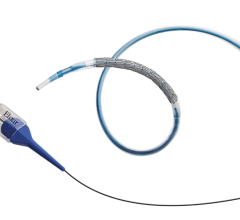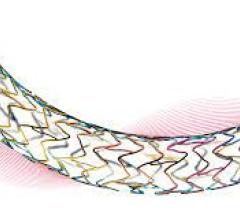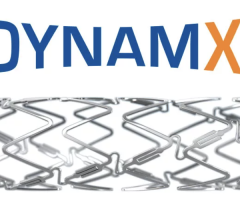October 15, 2008 – At TCT 2008, Boston Scientific Corp. announced 12-month left main and three-vessel disease subset data from its landmark SYNTAX trial comparing percutaneous coronary intervention (PCI) using the TAXUS Express2 Paclitaxel-Eluting Coronary Stent System to contemporary coronary artery bypass graft (CABG) surgery.
The results reinforced previously announced data demonstrating no overall statistically significant differences between PCI and CABG in rates of death or myocardial infarction (MI). The company also presented an analysis of the data based on the SYNTAX Score, a new tool that seeks to provide guidance to physicians on optimal treatment options for this high-risk group of patients, showing similar safety and efficacy outcomes for two- thirds of SYNTAX randomized patients.
The SYNTAX trial is the first large scale randomized, controlled clinical trial comparing PCI using drug-eluting stents (DES) to CABG in patients with left main disease and three-vessel disease. These patient groups are typically treated with CABG and represent a population with far more complex anatomy and advanced disease than those studied in prior DES clinical trials.
The goal of the trial is to expand the body of knowledge of PCI use and help inform physicians and patients on appropriate treatment options for the sickest patients.
According to Boston Scientific, the SYNTAX Score is breaking new ground by scientifically defining a new measure for anatomical complexity that seeks to provide guidance to physicians on optimal treatment options for this high-risk group of patients.
The SYNTAX Score characterizes coronary anatomy based on lesion frequency, complexity and location, relying on data from the SYNTAX trial, and assigns a score to each patient. The analysis of the raw SYNTAX Score data presented demonstrated that PCI and CABG patients whose scores fell into the lower or intermediate terciles of complexity had similar rates of MACCE (Major Adverse Cardiovascular or Cerebrovascular Event rate, including all-cause death, stroke, MI and repeat revascularization) at 12 months. For patients whose SYNTAX Score fell into the upper tercile -- those with the greatest lesion complexity -- there was a significant increase in MACCE for PCI patients compared with CABG patients.
The 12-month subset results for patients with left main disease reported comparable rates of overall MACCE for the CABG group and the PCI group (13.6 percent for CABG versus 15.8 percent for PCI, p=0.44), as well as similar overall safety outcomes (death, stroke, MI) for the two groups (9.1 percent for CABG versus 7.0 percent for PCI, p=0.29). As expected, the rate of revascularization was significantly higher in the PCI group (12.0 percent for PCI versus 6.7 percent for CABG, p=0.02), while the rate of stroke was significantly higher in the CABG group (2.7 percent for CABG versus 0.3 percent for PCI, p=0.009). The subset results for patients with three-vessel disease reported comparable overall safety outcomes for the two groups (6.4 percent for CABG versus 7.9 percent for PCI, p=0.39), an expected higher rate of revascularization for PCI (14.7 percent for PCI versus 5.4 percent for CABG, p=28mm in length or requiring multiple stents.
For more information: www.bostonscientific.com


 July 02, 2024
July 02, 2024 









